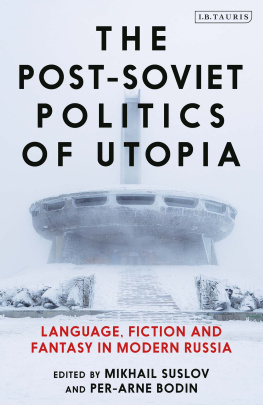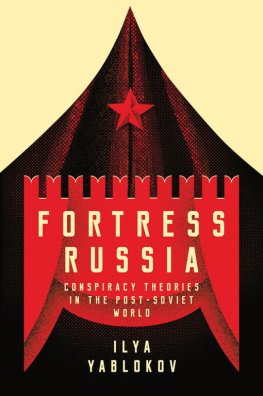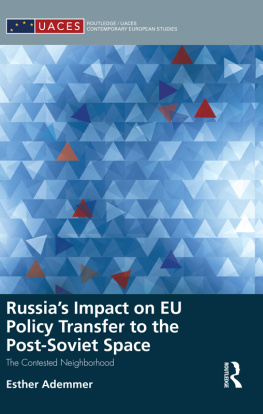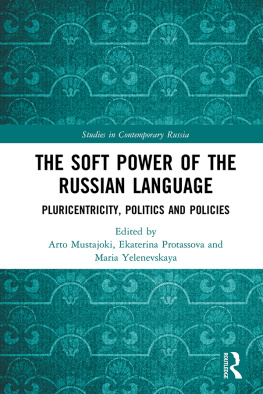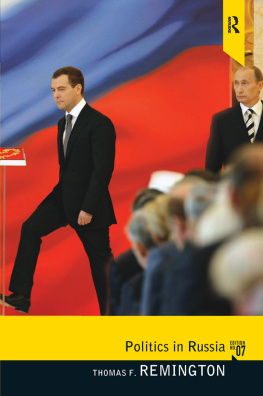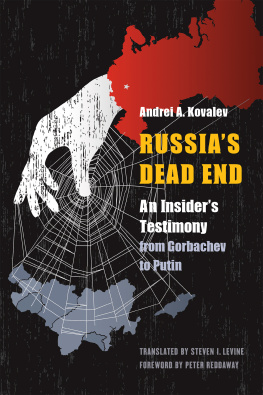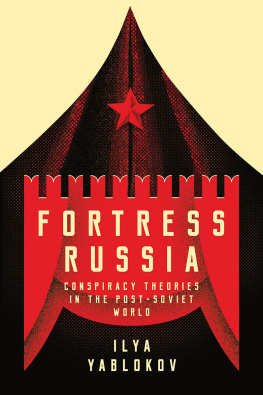
The Post-Soviet Politics of Utopia

Contents
Anton Chumak, New Earth, 2015.
The Plumbum-Cobalt Society. Still from video installation The Hunting Fragment: The Russian Stereo, 2016.
The Pskov sacred hill.
The Trumpeting Angel of Chernobyl.
Per-Arne Bodin is Professor Emeritus of Russian and Polish Literature at Stockholm University. He is also a Doctor Honoris Causa in theology at Uppsala University. His research interests include Russian and Polish literature, Orthodox religion, Church and culture.
Edith W. Clowes holds the Brown-Forman Chair in the Humanities and teaches Russian language, literature and culture and Czech literature in the Department of Slavic Languages and Literatures at the University of Virginia (Charlottesville). Her primary research and teaching interests span the interactions between literature, philosophy, religion and utopian thought
Maria Engstrm is Associate Professor of Russian, School of Humanities and Media Studies at Dalarna University, Sweden. Her research focus is on the post-Soviet right-wing intellectual milieu, the role of the Orthodox Church in Russian politics, contemporary Russian Utopian imagination, and Imperial aesthetics in post-Soviet literature and art.
Maria Galina is the author of several fiction books and also of two collections of articles Science Fiction from the Biologist Point of View (2008) and Not Only About Science Fiction (2013) dedicated to SF and its history.
Sofya Khagi is Associate Professor of Russian Literature in the Department of Slavic Languages and Literatures, University of Michigan, Ann Arbor. She has published on nineteenth- and twentieth-century Russian poetry, post-Soviet literature, science fiction and contemporary Baltic literatures and cultures.
Go Koshino is an associate professor in the Slavic-Eurasian Research Center, Hokkaido University in Japan. He is engaged in a joint research project on comparative study of socialist red cultures in countries of the former Soviet Union, China and Vietnam. He is also working on other topics: Russian SF, the image of illness in nineteenth-century Russia, the memory of the Napoleonic War, and Belarusian literature.
Mark Lipovetsky is Professor and Chair of the Department of Germanic and Slavic Languages and Literatures, University of Colorado, Boulder. He is the author of eight books and more than a hundred articles published in the US, Russia and Europe.
Ingunn Lunde is Professor of Russian at the University of Bergen and Professor II of Russian Literature and Culture at the University of Troms. Her research interests include Russian sociolinguistics, Slavic medieval culture and Russian literature of the nineteenth to twenty-first centuries.
Muireann Maguire lectures in Russian at the University of Exeter. She is currently working on Hideous Agonies, a study of childbirth as a theme in Russian and Western literature. Other research interests include nineteenth-century Russian literature, particularly Tolstoy and Dostoevsky; science fiction; and Gothic literature.
Anastasia Mitrofanova is Chair of Political Science, Church-State Relations and the Sociology of Religion at the Russian Orthodox University as well as Professor at the Russian State University for the Humanities (RGGU) and a fellow of the AURORA consortium. Her research interests include the influence of Orthodox Christianity on world politics, nationalism in todays Russia and government-initiated nation-building projects in Belorussia and Moldova.
Kre John Mjr is a research librarian at the Western Norway University of Applied Sciences and a lecturer in Russian at the University of Bergen. He has published on Russian intellectual history, Russian imperial history and contemporary ideologies. He is currently working on an edited volume on the civilizational discourse in contemporary Russian intellectual and cultural production.
Andrei Rogatchevski is currently Professor of Russian Literature and Culture at UiT The Arctic University of Norway (Norway). He is an experienced scholar whose fields of research include Russian literature, films and culture. In addition, he studies Czech culture, the cultural background of Russian immigrants in the United Kingdom and extreme right-wing extremism in post-Soviet Russia.
Lara Ryazanova-Clarke is Head of Russian and Director of the Princess Dashkova Russian Research Centre at the University of Edinburgh. She is a series editor of the Russian Language and Society book series at Edinburgh University Press. Her research focuses on Russian sociolinguistics and discourse studies.
Victor Shnirelman is a senior researcher of the N. N. Miklukho-Maklai Institute of Ethnology and Anthropology at the Russian Academy of Sciences and an author of over 300 works, including more than twenty monographs on archaeology. Shnirelmans main fields include the ideologies of nationalism in Russia and the CIS, ethnocentrism and irredentism.
Mikhail Suslov is Assistant Professor of Russian History and Politics at the Department of Cross-Cultural and Regional Studies, University of Copenhagen. His area of expertise is Russian and East European intellectual history. Specifically he is interested in right-wing and conservative ideologies, geopolitical and religiously-motivated ideas, and utopias.
Sanna Turoma has authored and co-edited several articles and books in Russian literature and cultural studies. In addition to cultural and intellectual history she has also published works in contemporary culture, poetry, and media. Her research interests include questions of empire, space, and geopolitics, and she is currently working on an edited volume on the civilizational discourse in contemporary Russian intellectual and cultural production. Her monograph Brodsky Abroad: Empire, Tourism, Nostalgia (University of Wisconsin Press, 2010) is forthcoming in Russian in 2020 from Novoe literaturnoe obozrenie.
This book emerged from the international conference titled Russian World and Other Imaginary Places: (Geo) Political Themes in Post-Soviet Science Fiction and Utopias, which took place at the Uppsala Center for Russian and Eurasian Studies (now the Institute for Russian and Eurasian Studies, http://www.ires.uu.se/) on 2324 March 2017. This event was possible thanks to the generous conference grant provided by the Swedish Research Council. We want to acknowledge support from Stockholm University and the University of Copenhagen for the realization of the project. We would also like to thank the Uppsala Center for Russian and Eurasian Studies, as well as Stiftelsen Olle Engkvist Byggmstare, for their contributions towards publication costs for this volume.
Mikhail Suslov
Per-Arne Bodin
Mikhail Suslov and Per-Arne Bodin
Utopias and utopianism
This book inquires into the ways in which utopian narratives interact with political discourses and facilitate identity-making in post-Soviet Russia. We argue that the study of socio-political science fiction and utopias exposes the ideational tracks on which Russian society in Putins third presidency glided smoothly into the annexation of Crimea, the war in Donbas and confrontation with the West. The volume brings together various academic perspectives, including literature studies, cultural studies and studies of ideologies and politics in order to comprehensively analyse the syncretic genre of SF. Here it is considered as a literary and cultural phenomenon, but also as an instrument for expressing and propagating certain political views. For this purpose, the terms political SF, speculative fiction, utopias, utopian fiction are used interchangeably, because they all suggest one simple idea that we can invent our future.
Next page
